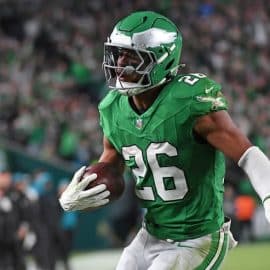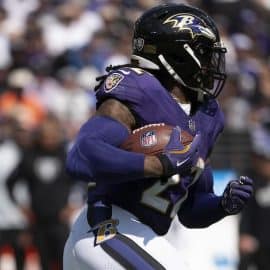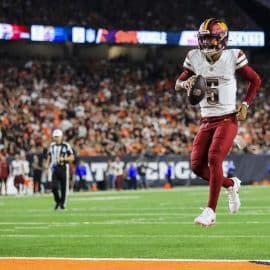It’s been well-documented at this point that just hours before the NFL deadline the Pittsburgh Steelers offered running back Le’Veon Bell a contract. NFL.com indicated that the deal was $70 million over five years, which averages out to $14 million per year. During a Tuesday appearance on Sirius XM NFL Radio, Adisa Bakari, Bell’s agent, indicated that the original report on what his client was offered was not accurate, though no further numbers were given. Either way, Bell turned the offer down and word is that he wanted something in the neighborhood of $17 million per year.
Therefore, the only numbers we really have to go on are $14 million per year (what the Steelers reportedly offered) and $17 million (what Bell wanted). Is Bell reliable enough for that kind of money? Is any running back reliable enough for that kind of money?
Let’s start with Bell. First, we’ve already established that he is presently the best running back in the NFL when healthy and playing. But healthy and playing connects to reliability, does it not? And let’s face it, there have been some issues on that front. Back in November of 2015, Bell suffered a season-ending MCL injury against the Bengals, which prompted surgery. There was also that 2017 playoff game against the New England Patriots where he had to leave in the second quarter due to a groin injury. That said, Bell’s slow, patient, and elusive running style does not lend to his getting hit hard very often. Due to that and the fact that he has come back quite nicely from that MCL injury, it would seem that he is about as likely to be injured as any other running back. In fact, given his running style and the fact that the Steelers’ line is quite good, if one was feeling generous, you might even say that he is less likely to be injured than some other backs.
However, there have been some off the field issues that have caused him to miss time which need to be delved into.
Back in August of 2014, there was the DUI and marijuana possession charges with LeGarrette Blount which resulted in a suspension. In August of 2016, Bell was suspended three games for violating the NFL’s substance abuse policy. And there was his missing training camp last season, which truly seemed to impact his initial performance, as well as the likelihood he will miss camp again at the start of this season. When you factor in that two of his problems happened in August, which is prior to the season when there is more down time and less structure, one would have to say that Bell is more likely to have something off the field impact his performance or playing time than most running backs.
And finally, there’s what we know about running backs as a whole in terms of reliability later in their careers. The average career length of NFL running backs is the lowest of any NFL position at 2.57 years. Of course, that doesn’t tell the whole story. When one looks at the stats of some very recent and former elite running backs- Adrian Peterson, Jamaal Charles, and Marshawn Lynch, for example- although things can change, their drop off year is usually pretty evident. For Peterson, play dropped off after year nine when he went from 1,485 yards rushing to 72. He hasn’t been able to consistently put on the pads since. For Charles, a dual threat running back like Bell, performance dropped off after year seven and didn’t reverse. For Lynch, the drop off came after year nine, though his retirement does put some questions into the mix. Taken together, that’s an average drop in performance at 8.33 years.
So let’s sum it up. Bell is perhaps less likely to be injured early than some other running backs (maybe), but is more likely to have off the field issues. Therefore, given all of that it is feasible to suggest that he is likely to have about average reliability for a running back of elite stature, meaning that if we round up from the Peterson, Charles, Lynch discussion we land at about 8.5 years before the drop off occurs. Since he’s about to start his 6th season, and the reported contract offer was for five seasons, we’re talking about 3.5 years of the five would be done before his play began to suffer. Even if we gave him a big benefit of the doubt and said he’d make it through nine seasons without a major drop off, that would still leave one year on the contract where things went south.
The Steelers made him an offer to pay him like the best running back in the NFL in the here and now, which is what he is. In fact, they reportedly offered him over 30 million guaranteed in the first two years, which makes sense given the prediction regarding his reliability. Next, they offered him about $14 million per year when you average it out, which compares very well to his colleagues at the position. And last, the deal seems to take into account his likely longevity in terms of guaranteed cash, but still offers him some benefit of the doubt in terms of about 1.5 years of longevity.
In the end, Bell gives the team their best chance to win now. Simply put, there is no running back by committee or other player that is going to perform like he does in the present. That said, this is a business and the reality is that with Ben Roethlisberger getting older, the team cannot mortgage the future on one player that they still haven’t won a Super Bowl with (that’s the goal, isn’t it?). The Steelers seemingly wanted to pay Bell like the best running back in the game in the here and now, and appeared to give him the benefit of the doubt in some areas. No Pittsburgh fan wants to see him go, and there is still some level of diminishing hope. But fair is fair. And that’s exactly what the Steelers offer was, from what we can gather regarding the reports.
Add The Sports Daily to your Google News Feed!





